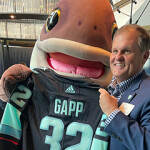New partnership to tackle seafood traceability
A new effort funded by the U.S. government and several philanthropic foundations aims to improve seafood traceability by launching a knowledge-sharing network.
The Seafood Alliance for Legality and Traceability (SALT) will promote legal and sustainable fisheries by improving supply chain transparency and traceability. The partnership will bring together seafood industry representatives, nongovernmental organizations, and governments to collaborate on ways to combat illegal seafood and share best practices.
The exact activities of the partnership will be decided in the coming year with input from seafood companies and other interested parties.
“SALT will catalyze solutions that transform how the seafood industry and governments collect, share, verify, and ultimately utilize data in the pursuit of sustainable fisheries,” Tobias Aguirre, CEO of FishWise, told SeafoodSource.
The novelty of the approach is in bringing together diverse stakeholders with a wide array of backgrounds and ideas, Aguirre said. SALT will support and complement other sustainability and traceability initiatives such as the Seafood Task Force, the Global Dialogue on Seafood Traceability, and the Oceans and Seafood Markets Initiative.
The United States Agency for International Development is providing the primary funding – USD 1.1 million (EUR 943,000) – for the first 12 months to the nonprofit seafood consultancy FishWise, which will coordinate the partnership.
Meanwhile, the Walton Family Foundation has committed to provide at least USD 1 million (EUR 857,000) per year for projects that will advance the goals of SALT. The Walton money will go towards existing programs that support Walton grantees in Peru, Chile, Mexico, Indonesia, Japan, Spain, and the United States to both improve sustainability and create market incentives for better fisheries management.
“Traceability is a critical component of an efficient, modern and sustainable seafood industry,” Teresa Ish, Oceans Program Officer at the Walton Family Foundation, said in a statement. “This is an exciting collaboration that we hope will incentivize and support seafood companies to implement best practices, more effectively self-regulate and play a role in stronger fisheries management.”
The David and Lucile Packard Foundation and Gordon and Betty Moore Foundation are also involved in the partnership.
The partnership will initially convene meetings of interested parties to identify and agree on the problems it will seek to address, within three larger topics: expanding electronic catch documentation traceability programs, bolstering the ability of countries that export fish to implement those traceability systems, and increasing incentives for industry to adopt such systems.
“Poor transparency and supply chain traceability are major impediments to achieving our goals around ending illegal fishing,” said Meg Caldwell, deputy director for oceans at the David and Lucile Packard Foundation. “Our hope is that this learning network will enable better information to improve seafood transparency and traceability policies and practices, which are needed as we work together toward responsible and evidence-based marine resource management around the world.”
The initial 12-month co-design process will enable to SALT to hear from potential partners and secure buy-in; strong industry participation is crucial, Aguirre said. In later years, SALT partners will brainstorm specific solutions.
By getting involved, industry partners can learn about the value of traceability for supply chains, how to comply with import requirements, reduce business risk, and contribute to sustainable fisheries. Producer countries will learn how traceability helps verify legality of harvests, while consumer countries will be able to share information about seafood import regulations.
FishWise will also create a website to post information on SALT meetings, pilot projects and other advancements.
Many types of technologies and methods can improve traceability, Aguirre said, but “the important thing is that these approaches became interoperable over time, meaning that they have shared data communication standards and practices.”
“Currently, there are multiple systems operating under different structures, and it’s difficult to get them to work together,” Aguirre said. Traceability systems need to be aligned in the same way that cell phone users with different phone types on different networks can still communicate with each other, he added.
Aguirre believes that traceability can provide many benefits for fishermen and seafood companies, such as greater public confidence in companies’ seafood, sustainability practices and social responsibility, while reducing the risk of recalls and making supply chains more efficient.
“We want to identify best practices that can be shared and promoted widely, to accelerate the adoption of traceability,” Aguirre said.






Share